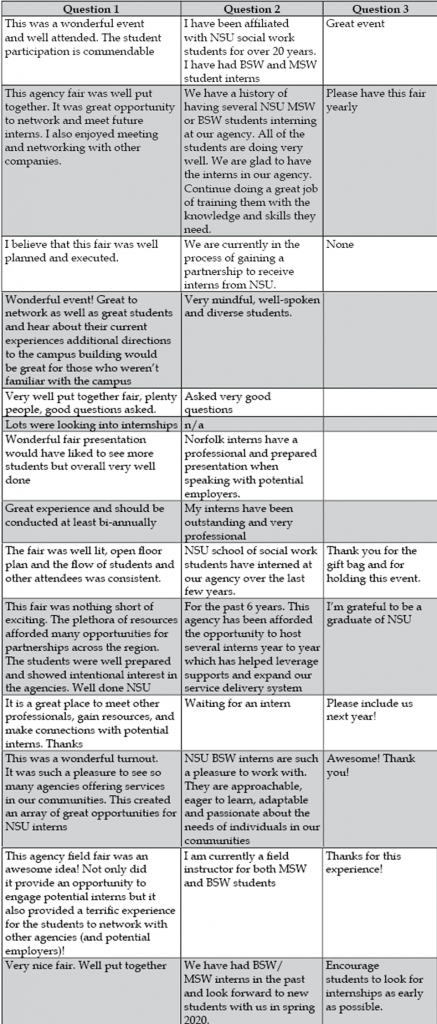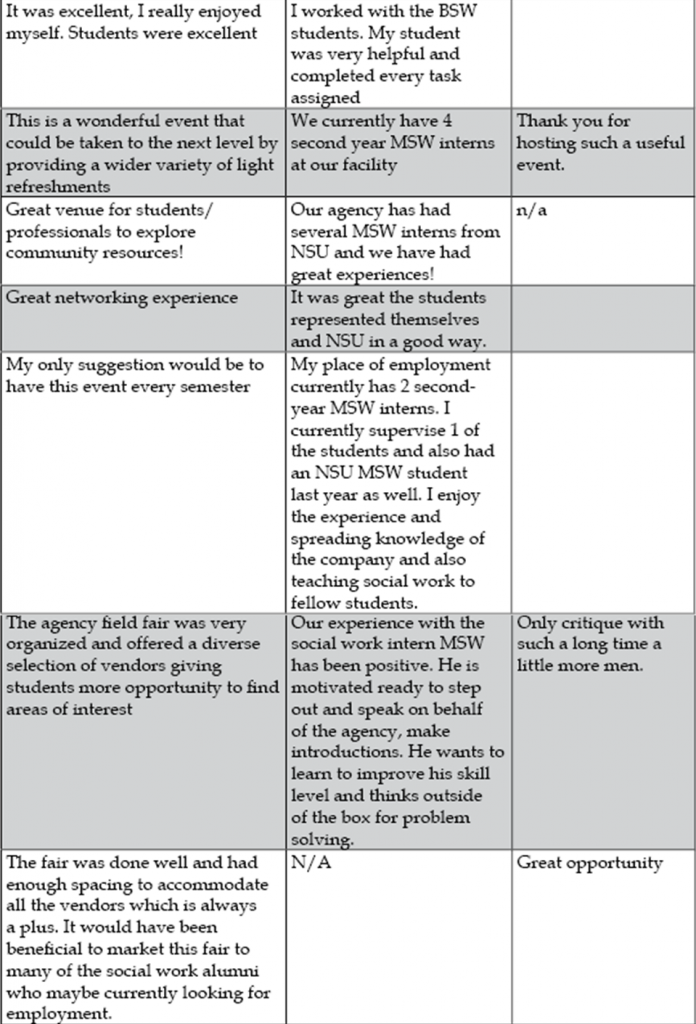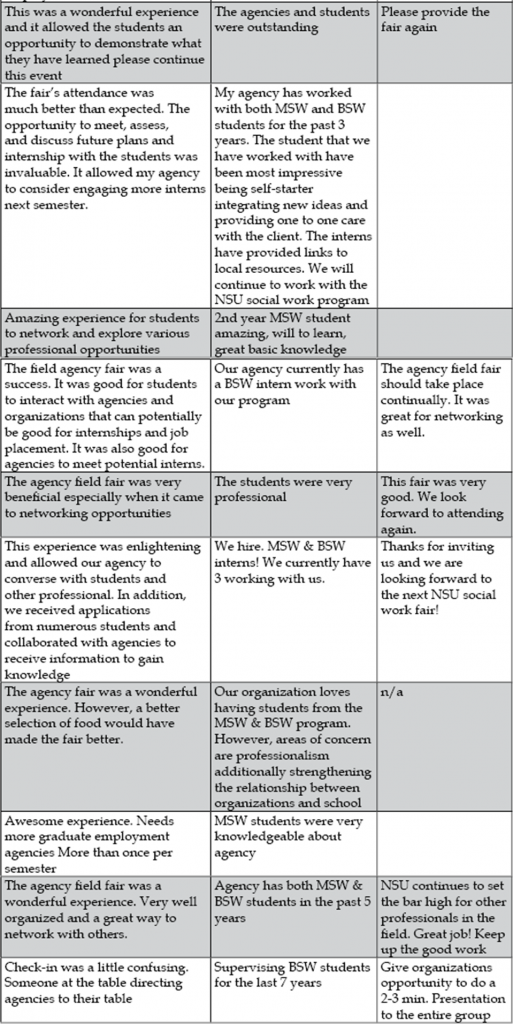Field education is the signature pedagogy at accredited social work education programs. The purpose of field education is for students to integrate the theoretical and conceptual knowledge, values, and skills learned in their courses into practice (CSWE EPAS, 2015). In addition, field education serves as the liaison between the school or department of social work and the surrounding community. The role of the field education office is to build partnerships with agencies and encourage students to be a part of that process to strengthen their skills and ensure that community partnerships are sustained. The purpose of this article is to describe how one Historically Black College or University (HBCU) prepares students for field education by engaging them in professional development experiences, community engagement, and intentional supports. The culminating professional development experience for social work students at this university is a social work agency fair where students engage with social service organizations and demonstrate soft skills. In order to support students’ demonstration of professionalism, the school of social work provides intentional supports and mock interviews, and engages them in interprofessional education activities.
Support for Social Work Students
Kamali et al. (2017) bring attention to the lack of importance positioned by BSW programs to prepare their undergraduate students for field placements. They suggest that the lack of pre-field training results in high levels of anxiety among students as they grapple with the unknown (Kamali et al., 2017). An unfamiliar environment breeds fear and worry for students (Kamali et al., 2017); the resolve conceivably is the intentional preparedness of undergraduate students for field placement. It has been suggested that HBCUs offer a stable and nurturing physical and mental space for those most at risk of not entering or completing college: low-income, first-generation college students. Some students who attend are academically and socially underprepared for college. However, they persist with emotional and professional supports (Lomax, 2015). Considering some of the promising characteristics of students who may come to HBCUs, it is important to ensure that supports are in place to prepare them to be successful in the social work profession.
Preparing for the critical element of field work at HBCUs begins with the intentional supports by student-centered faculty members who engage students in nurturing advisement. When students define student-centered faculty, the repeated concept of “going above and beyond” through intrusive advisement is documented (Guiffrida, 2005). These faculty advisors exceed the customary mentorship roles and segue into “othermothering,” a long-held African American community tradition in education that has evolved as the norm at HBCUs (Guiffrida, 2005; Williamson-Ashe, 2020). The student-centeredness exercised by faculty advisors is revered by African American students because these professors advise about academic, career, and personal issues (Guiffrida, 2005).
The aforementioned University’s School of Social Work engages in intrusive advisement. Often misidentified as a 2-plus-2 model, the split model of advisement institutes professional academic advisors in the advising center during the first and second years, previous to sixty credit hours of enrollment. Social work professors provide intrusive advisement for students accepted into the professional school of social work during their third and fourth academic years beyond sixty accumulated credit hours. Intrusive academic advisement is a proactive model that anticipates what problems may interfere with student success and provides the type of commentary that will aid students in navigating those concerns (Herget, 2017). This would describe the model in depth that is used at Norfolk State University.
Student-centered faculty preparing their third-year social work students for field work advise students of academic, career, and personal pitfalls through othermothering. Othermothering is not only inclusive of “going above and beyond,” but is also responsible for uplifting the culture and traditions of the African American community organic to students. This readies (prepares) the student foundation, socially and emotionally, for the application of theoretical knowledge and skills useful in field work.
Combined, these areas of advisement, student-centeredness, othermothering, and intrusiveness ensure that the social work student will be holistically prepared for field work, just as practicing social workers holistically engage clientele. These areas of advisement provide traction and present the platform for cohesiveness between theory and practice. The result is that students who are nurtured anticipate hurdles. They are self-aware and well informed for the field practicum.
The invitations were shared within the networks of the community to create a warm welcome to all guests. The month of October was dedicated to securing spots for the agency fair and to preparing students. The school of social work was able to secure three ballrooms within the student center. On the day of the agency fair, which took place in November, the team set up the ballrooms in a career fair style and added a registration table for agencies and students.
Career Preparation
The field education office partners with the on-campus career center for mock interviews. The career center hosts a professionalism workshop for junior-level BSW students who are preparing to enter the field practicum. Topics include interviewing techniques, resume pointers, and professional attire. The center provides additional one-on-one resume support, and assists students with enrolling into an employment system such as LinkedIn, to strengthen their market value for employment opportunities. The career center collaborates with the school of social work and hosts programs targeted for all social work students that focus on professionalism and interviewing. In addition, they partner with a local retail store that allows students to shop for business attire at a discounted price.
Junior-level students who are entering their senior field practicum are required to complete a comprehensive packet for field education that encompasses a cover letter, a resume, an application, an unofficial transcript, and responses to short-answer questions related to their readiness for practice. Once students submit their packets, they are eligible to schedule their mock interviews. The mock interviews are roughly 30 minutes in length and are conducted by a panel of three people that includes the field director, faculty members, and a staff member from the career center. The interviews take place in a two-way mirror simulation room, enabling faculty members who are not a part of the panel to observe the process and prepare feedback.
The interview team follows a rubric and provides the student with supportive feedback directly after the interview, which the student can apply once they interview with a prospective agency. Students are also asked to discuss their experiences with the panel and observers. This process helps students prepare for interviews and the social work profession.
Interprofessional Education
Many social work students are prepared to complete the course work and field practicum required to earn a social work degree; however, few social work students expect to engage in practical experiences in addition to the course work and internship experience that would support their learning in preparation for the profession. The aforementioned university’s undergraduate social work program intentionally has junior-level students participate in an interprofessional education seminar to support their professional development, fine-tune their general practice skills, and prepare them to be active participants at the agency fair. This seminar also prepares them for their field practicum during their senior year.
Interprofessional education (IPE) “occurs when students from two or more professions learn about, from, and with each other to enable effective collaboration and improve health outcomes” (WHO, 2010, p. 7). Prior to attending the IPE event, the social work students were introduced to interprofessional generalist practice courses and engaged in class discussions related to professionalism. Specifically, students focused on how to engage their peers and faculty members at the host university, the importance of working on teams, and professional attire and overall presentation of self in professional settings. In addition, the students and professors reviewed the multiple roles that social workers may have on an interprofessional team. They were also informed of the format of the seminar and all of the diverse majors that would be present at the symposium. Lastly, the instructor stressed to the students that the interprofessional education seminar was a practical stimulation experience to prepare them for the field education process.
The goal of the IPE experience was to have students work together to review a case and discuss their perspectives and concerns pertaining to the case from a professional standpoint. Interprofessional partnerships stress that professionals on a team understand each other’s roles and share a common goal to attain progressive outcomes for clients (Begun & Mosser, 2014).
As with professional conferences, all students had to register for the seminar online. The event was held in a large ballroom that accommodated over 100 students. The IPE seminar took place at a neighboring university, hosted by the pharmacy department. Social work students were invited because the host university did not offer a social work program. The IPE seminar included social work, pharmacy, nursing, physician assistant, and speech and physical therapy students. The format included a keynote speaker who discussed interprofessional practice; students were situated at different tables with students from other professions and assigned a case to discuss and answered questions that were developed by faculty. Faculty from both universities facilitated the discussions at the tables with the students.
The IPE seminar offered a professional development opportunity outside of the classroom to help students practice in a real-life setting and to apply social work knowledge, values, and skills. When students from the social work program begin their internships, they will be expected to work well with others, demonstrate interprofessional behaviors, and represent the social work profession in an ethical manner. The IPE seminar focused on relationship building and the development of social work skills. Additionally, the goal of the activity was to empower students to embrace and promote their profession.
The students processed their IPE experiences and reflected on how the activity reinforced the importance of demonstrating professional behaviors and how it was empowering to discuss their role on an interprofessional team. Overall, the IPE event was an applied learning experience off-campus that helped to prepare students for the next step of the process in their academic career, which is field education. Most students felt confident about the agency fair and looked forward to networking with prospective agencies.
The Culminating Experience: The Agency Fair
In an effort to strengthen the school’s social work presence within the community and foster students’ professional development, the field education office decided to plan an agency fair. The agency fair took place at a mid-sized HBCU in the South Atlantic region in the US. The school of social work at the university offers BSW, MSW, and PhD programs. The goal of the agency fair was two-fold. First, to strengthen partnerships within the community in order to provide more internships and service-learning opportunities for social work students, and second, to provide students with an opportunity to engage with professionals.
In preparation for the fair, the field directors met with faculty who taught generalist practice II courses, which were the courses students completed prior to entering their field practicum experience, to develop a plan. The field directors met with all generalist practice II classes to discuss the agency fair in detail and also discuss their experiences with other professional development experiences and professional advisement. The field directors also invited all other social work students, faculty, and alumni to the fair. The agency fair comprised over 40 local social service agencies, who provided information about the services they provide and the populations they serve. The fair was an opportunity for agencies, students, and alumni to network. It also provided students with opportunities to interview for an internship and/or employment. Freshman- and sophomore-level social work students were invited as well, to gain insight on the field education process and prospective internship sites available to them during their senior year.
Surveys were administered to agency participants to obtain feedback on the inaugural agency fair. Of the 40 registered agencies, 31 submitted completed surveys. The survey consisted of the following open-ended questions:
- Please provide any comments or critiques in regard to the Agency Fair experience?
- Please explain your experience with Norfolk State University Social Work student interns?
- Other comments
Table 1: Survey Results
Areas for Improvement
The feedback indicated that the fair provided a great networking experience for students and agencies. Some constructive feedback was that the event could offer a little more guidance on how to find the event on the campus. Overall, the agencies thought the students were very professional and prepared for the event. The agencies also enjoyed meeting future students.
Implications for Social Work Education
The social work field fair is designed to create the opportunity to teach social work students a wide variety of skills. The agency field fair gives students the opportunity to interact with a larger network of social workers within the community. An implication for social work education is the importance of communication and collaboration between field instructors, students, and agencies. Social work field instructors teach students a wide variety of micro and macro skillsets that are developed in the larger systems. These skills include meditating, confrontation/advocacy, effecting organizational change, using a milieu as a community, and community organizing. Social work interns are expected to learn many of these skills, with greater emphasis on the individual skills in direct practice settings and on systems skills in “macro” settings (Homonoff, 2008). The agency field fair provides the opportunity to share vital information with all social work students, and provides students the opportunity to demonstrate skills such as actively listening, learning the organizational structure of various agencies, developing empathy, discovering resources available for various populations of oppressed people, and thinking critically with community agencies. Creating interactions with multiple agencies in a controlled environment provides students the opportunity to practice these skills continuously for several hours at the field fair.
Field instructors must adhere to the Council on Social Work Education competencies and must specify the practice behaviors necessary to prepare interns for current practices and assess the relevance of theories taught to support those competencies (Miehls et al., 2013). The agency field fair reinforces competencies #1, #2, and #6.
By participating in the fair, social work students were able to understand the role of other social work professionals, engage in inter-professional dialogue, and demonstrate professional demeanor in behavior and appearance, which is part of competency #1.
Social work students must demonstrate ethical and professional behavior as social workers and seek to understand the value base of the profession and its ethical standards. Furthermore, competency #2 proposes that social work students are to engage diversity and differences in practice. Social work students must understand how diversity and different characteristics shape the human experience and are critical to the formation of identity. Students must apply and communicate an understanding of the importance of diversity and differences in shaping life experiences in practice at the micro, mezzo, and macro levels. It is imperative to present themselves as learners of social work and to engage constituencies as experts. Participation in the agency field fair provided an opportunity to demonstrate competency #6, which is to engage with communities’ social workers and understand that engagement is an ongoing component of the interactive process of social work practice. As we begin the process of engagement at the agency fair, it is our hope that the students will continue this interactive process upon becoming social workers for the communities.
Lastly, intentional advisement is a key component for students, and even more valuable today as they face increasing competition for field placement and employment. Encouraging student success is a multi-tier approach that requires advisement, professional development, and opportunities to integrate social work practice skills with other disciplines. In developing the agency fair, the field directors and faculty aligned the curriculum with the purpose and mission of the school and the social work competencies. The agency fair will be an annual event for students to demonstrate professionalism and engage with the community. It was a collaborative event designed intentionally to strengthen the school of social work’s presence within the community, support student development, and secure new field sites for future students.
References
Begun, J. W., & Mosser, G. (2014). Understanding teamwork in health care. McGraw-Hill Education LLC.
Council on Social Work Education (2015). Education policy and accreditation standards. https://www.cswe.org/getattachment/Accreditation/Standards-and-Policies/2015-EPAS/2015EPASandGlossary.pdf.
Guiffrida, D. (2005). Othermothering as a framework for understanding African American students’ definitions of student-centered faculty. Journal of Higher Education, 76(6), 701–723.
Herget, A. (2017, January 9). Intrusive academic advising: A proactive approach to student success. HigherEdJobs. https://www.higheredjobs.com/articles/articleDisplay.cfm?ID=1153
Homonoff, E. (2008). The heart of social work: Best practitioners rise to challenges in field instruction. The Clinical Supervisor, 27(2), 135–169.
Kamali, A., Clary, P., & Frye, J. (2017). Preparing BSW students for practicum: Reducing anxiety through bridge to practicum course. The Field Educator, 7(1), 1–16.
Lomax., M. (2015). Six reasons HBCUs are more important than ever. UNCF. https://uncf.org/the-latest/6-reasons-hbcus-are-more-important-than-ever
Miehls, D., Everett, J., Segal, C., & duBois, C. (2013). MSW students’ views of supervision: factors contributing to satisfactory field experiences. The Clinical Supervisor, 32(1), 128–146.
Williamson-Ashe, S. R. (2020). A distinct set of characteristics for Black women at an HBCU: Tortured by slavery—Shaped by intersectionality—Liberated into othermothering. In L. Underwood & D. Hutchinson (Eds.), Intersectionality: Understanding women’s lives and resistance in the past and present. Lexington Books.
World Health Organization (WHO) (2010). Framework for action on interprofessional education and collaborative practice. https://www.who.int/hrh/resources/framework_action/en/


